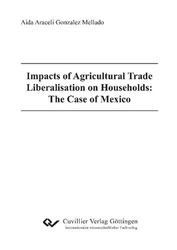| Departments | |
|---|---|
| Book Series (97) |
1383
|
| Nachhaltigkeit |
3
|
| Gesundheitswesen |
1
|
| Humanities |
2379
|
| Natural Sciences |
5409
|
| Mathematics | 228 |
| Informatics | 320 |
| Physics | 980 |
| Chemistry | 1365 |
| Geosciences | 131 |
| Human medicine | 243 |
| Stomatology | 10 |
| Veterinary medicine | 108 |
| Pharmacy | 147 |
| Biology | 835 |
| Biochemistry, molecular biology, gene technology | 121 |
| Biophysics | 25 |
| Domestic and nutritional science | 45 |
| Agricultural science | 1005 |
| Forest science | 201 |
| Horticultural science | 20 |
| Environmental research, ecology and landscape conservation | 148 |
| Engineering |
1799
|
| Common |
97
|
|
Leitlinien Unfallchirurgie
5. Auflage bestellen |
|
Advanced Search
Impacts of Agricultural Trade Liberalisation on Households: The Case of Mexico (English shop)
Aida Araceli Mellardo Gonzalez (Author)Preview
Table of Contents, Datei (64 KB)
Extract, Datei (93 KB)
The analysis of expenditures for different household categories within a CGE framework is a helpful instrument for economists and policy makers. This approach allows researchers to focus on the possible effects that macroeconomic changes and trade reforms might have on household categories, especially in developing countries.
This dissertation presents a new household expenditure estimation methodology and an application of it. The estimation is based on a complete household demand system, which is
integrated into a household module. The complete demand system regarded in this approach is the one proposed by DEATON and MUELLBAUER (1980) the Almost Ideal Demand System in its linear version (LA/AIDS). The LA/AIDS contains a set of demand functions
defining how households in function of prices and household preferences allocate commodities. The household module computes expenditure changes based on changes on prices from the GTAP model and on elasticities coming from the LA/AIDS for Mexican
households.
The evaluation of household preferences shows that for non-poor households in Mexico, the decisions of purchase between food products and non-food products and services
are independently made. Meanwhile, poor households try to first cover their food needs, and as a result of this, are delaying the acquisition of other goods and services.
This investigation then evaluates the effects of three different trade reforms on households’ expenditures in Mexico. The results show that Mexico’s efforts to reach a bilateral trade agreement with main trading partners pay off for households as prices of consumed commodities decrease driven by lower values of import commodities. Thus, the
first scenario simulating 3 different Free Trade Agreements was identified as the most profitable trade setting for the poorest Mexican households because the price of staple foods decreases considerably. A restricted multilateral agreement considering a partial liberalisation (the second scenario simulating a possible outcome of the Doha Round), was found to be the
most prudent and advantageous trade setting for the Mexican households as benefits will be distributed equally across more household categories. The third scenario evaluates a full trade
liberalisation, and it was found to improve the performance of export sectors worldwide. The high prices brought about in Mexico might been compensated with gains for farm households, while urban households might lose. However, the inclusion of the income side is required to make conclusive statements on the real effects of a fully liberalised economy in Mexico.
| ISBN-13 (Printausgabe) | 3869551216 |
| ISBN-13 (Hard Copy) | 9783869551210 |
| ISBN-13 (eBook) | 9783736931213 |
| Language | English |
| Page Number | 274 |
| Edition | 1 Aufl. |
| Volume | 0 |
| Publication Place | Göttingen |
| Place of Dissertation | Universität Berlin |
| Publication Date | 2009-10-26 |
| General Categorization | Dissertation |
| Departments |
Agricultural science
|








